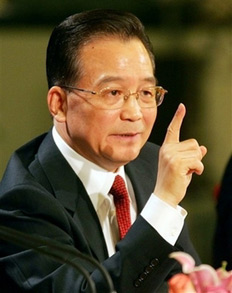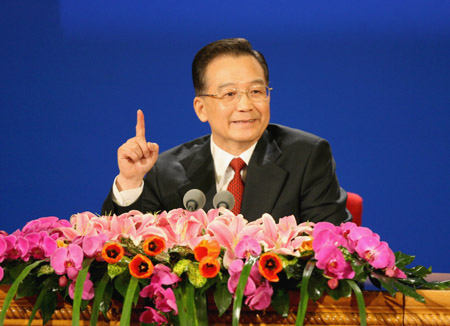Wen calls for adoption of convention on outer space
(chinadaily.com.cn/Xinhua)Updated: 2007-03-16 11:34
Chinese Premier Wen Jiabao on Friday urged relevant countries in the world to adopt and sign an international convention on peaceful utilization of outer space at the earliest date possible.
 Premier Wen Jiabao speaks at a press conference after the closing ceremony of the National People's Congress, in Beijing's Great Hall of the People March 16, 2007. [AP]  |
Wen said the test is not targeted at any country, nor will it threaten any country, nor does it violate any international treaties.
He pledged China will continue to pursue a peaceful development
road.
"China always advocates for the peaceful utilization of outer space
and we are always opposed to an arms race in outer space," Wen said, adding
Beijing was repeating its calls for an international convention banning weapons
in outer space.
The Chinese premier said that China's annual defense
budget is much lower than those of some developed countries, even less than some
of the developing countries. He also said that China has a long borderline and
sealine to be protected.
Reserves: gradual diversification of assets
Meanwhile, Beijing's move to set up an investment arm to manage some of its huge foreign exchange reserves won't have an adverse impact on the U.S.- dollar denominated assets China holds, Wen Jiabao said.
Wen acknowledged the question of how to manage China's colossal forex reserves is a big issue and also a difficult issue.
"The fact is that U.S. dollar-assets account for the majority of China's forex reserves," Wen said. "China setting up an investment agency wouldn't adversely affect the dollar assets (in the reserves)."
The government is currently forming a new agency that economists expect will be charged with investing around $200-400 billion of China's $1.1 trillion worth of forex reserves in longer term assets.
Stock Market: Oversight is key
Discussing China's stock market, Premier Wen, a geologist by training, said
that China has to improve supervision of the market and build an open,
transparent financial system. Merely two weeks ago, a 9 percent plunge in the
Shanghai stock market triggered a global sell-off.
The government will
improve the quality of publicly traded Chinese companies, institute an open,
fair and transparent market and augment oversight, the premier said.
"We also need to encourage and do a good job in the timely disclosure of information in the stock market," Wen said.
Most of the companies traded in China are government-owned, and economists say the market's performance has little connection to the overall health of the Chinese economy.
|
|
Economy faces some problems
Wen said that China has the conditions for maintaining the current momentum of steady and fast economic growth and that his government has full confidence in its task.
Over the past years, China's economy has maintained stable and rapid growth, but "it is not a time for complacency", the premier told a press conference shortly after the closing of the annual parliamentary session Friday morning.
The Chinese economy still has some major problems, namely unstable, unbalanced, uncoordinated and unsustainable problems, Wen said.
The unstable matter is that China has an excessively high investment growth rate, excessively large extension of credit, excessive liquidity of the currency, and improper foreign trade and international payment, Wen said.
China has unbalanced development between urban and rural areas, between different regions, and between economic expansion and social progress, the premier said.
The primary, secondary, tertiary industries are not coordinated, investment and consumption are not coordinated, and China's economic growth relies too much on investment and export, said the premier.
The unsustainable issue is that China has failed to address well the issues related to energy saving, emission reduction and environmental protection, he said.
In order to achieve sustainable development, the premier said, China need to boost domestic consumption, push forward reform and opening-up, remove institutional obstacles, encourage intellectual and technological innovation, and make more efforts to conserve energy and reduce emissions.
"The conditions are there, and the most important factor is that we can strive for a peaceful environment for a long period of time to concentrate our resources and energy on economic development," Wen said.
"To achieve the task, although it is very arduous, we have full confidence," Wen said.
China's economic growth rate reached 10.7 percent in 2006, the fourth year in
a row that the country's GDP growth rate exceeded 10 percent while keeping the
inflation rate at a low level.
Taiwan: Direct links
urged
Premier Wen Jiabao said Beijing will keep pushing forward
the issue of direct links with Taiwan.
Both sides of the Taiwan Strait should aim for the launch of passenger charter flights at weekends and for more convenient freight charter flights ahead of overall direct links, he said.
He also said Beijing "hopes to realize the wish" of direct tourism across the
strait "as soon as possible".
"Ice-melting" Trip to Japan
Premier Wen said he hopes his visit to Japan next month would be an
ice-melting one, which could help overcome longstanding strains between the two
neighbors.
"If Japanese Prime Minister Shinzo Abe's visit to China in October last year was an ice-breaking journey, I hope that my visit to Japan in April will be an ice-thawing one," Wen said.
The Chinese premier said he would discuss the establishment of strategic and mutually beneficial ties, economic co-cooperation, technical, educational and personnel exchanges with Abe.
Admitting that problems exist, the premier noted that there is a cornerstone for bilateral ties: the three documents jointly issued by the two neighbors that summed up the past and outlined the future.
He urged the two sides to stick to the spirit of the three documents and
"take history as a mirror and look into the future."
Developing a
friendly ties is in line with the historical trends and the people's will, said
the premier.
"Both sides will also strive to promote scientific and
educational exchanges and exchanges between the two peoples, especially between
the youth and children," said Wen.
Socialist Democracy
The essence of China's socialist
democracy is to let the people be masters of the country and enable them to
oversee and criticize the government, Premier Wen Jiabao told reporters.
The premier said China will take into account of its own conditions and build
democracy in its own way.
Crucial year for cross-straits
relations
The year 2007 is crucial in safeguarding the peace and development of cross-straits, said Wen Jiabao.
The Premier restated that Beijing strongly opposes "de jure independence" of Taiwan and any other forms of secessionist activities.
"We keep a close eye on the secessionist attempts and activities. No one will be allowed to change the fact that Taiwan is an inalienable part of China's territory and its legal status that has been recognized internationally," said Wen.
Wen said the government will actively promote "Three Direct Links" across the Taiwan Straits and ensure the legal rights of Taiwan businesspeople in the mainland as the trade volume between two straits has amounted to $100 billion.
Wen also urged the Taiwan authorities to facilitate the exchanges between mainland and Taiwan. "The mainland compatriots have long wished to visit Taiwan and they have prepared for a long time."
The peace and development between the two sides of straits are historical
trend and no one could reverse this trend, he said.
Corrupt
Officials Will be Punished
The premier pledged to punish all corrupt officials.
"No matter what field is involved, no matter who is involved, no matter how high ranking he is, severe punishment will be handed out," vowed the premier.
He vowed to push forward the reform of the political structure, reducing the over concentration of powers and enhancing the supervision of the government by the people.
The premier also called for enhanced education of government officials and
leaders. "We should let every official and leader know that the water can carry
the boat, but it can also overturn it," said Wen.
Rights from
the people
Chinese Premier Wen Jiabao emphasized Friday that all rights come from the
people during a press conference after the closing of the annual National
People's Congress.
The premier started his conference by talking about
questions posted by netizens on the Internet. He said he paid high attention to
netizens' suggestions and concerns about social problems, such as the children's
health care.
The premier replied a primary student's letter Thursday with calligraphy and encouraged the student to study hard and grow healthily, Wen told reporters.
Wen also said that "We must understand one truth that all the government's rights are given by the people, we should rely on the people, work for people and try to be good servants."
Wen said China must adhere to its three-decade-old policy of reform and
opening-up in order to develop itself into a prosperous, democratic, civilized,
harmonious and modernized nation.
"We must hold a belief unswervingly:
we are surly able to develop China into a prosperous, democratic, civilized,
harmonious and modernized nation, as long as we emancipate our mind, keep
abreast with the times, and seek truth; as long as we keep reforming and opening
up; as long as we adhere to peaceful development, scientific development and
harmonious development," he said.
"The current government has worked for
four years, which told us that we must be aware of a truth: all power is given
by the people, everything belongs to the people, everything should be for the
people, everything must rely on people and everything owes to the people," he
said.
"The staff members of the government don't have any power except
working as good public servants for its people," the premier
said.
Education equality
The Chinese government will continue to promote education equality and address the social concerns of volunerable groups, especially the farmers, said the Premier Wen at the press conference.
Wen said that the aim of reform and construction is to meet people's material and cultural requirements. People's welfare involves the clothing, food, living and transportation. Currently, the most important thing is to promote the education equality.
"We will actively implement the employment policy, narrow the income gap, and establish the social welfare system that benefits both the urban and rural residents," Wen said.
Wen said the government has carried out many measures to solve the social welfare issues, with the focus on providing the institutional support, such as abolising agricultural tax and strengthening the nine-year compulsory education. The priorities should aim to address the concerns of the vulnerable groups, especially the farmers.
Minimum subsistence allowance
China is going to legislate on minimum subsistence allowance to improve the
living conditions of the needy, Premier Wen Jiabao said.
He said that
China is considering to establish a plan on urban and rural medicare reform
which will also eventually be complete with system guarantees.
China has
already legislated on the elimination of agricultural tax and agricultural
specialty property tax as well as the free nine-year compulsory education.
"Once system guarantee is in place, things will not change easily.
Neither will they change with government and leadership," he said.
Wen
said that the ultimate goal of China's reform and construction was to satisfy
the people's increasing material and cultural demand. To reach the goal, China
must address the issue of the people's well-being, which includes clothing,
food, housing and transporting.
"The most imminent one is to secure the
equal opportunity of the general public to education," he said.
Wen said
that the government would look to the disadvantaged group, especially farmers,
to solve the problems concerning people 's livelihood.
"The speed of a
fleet is not determined by the ship which travels the fastest, but the one that
travels the slowest. If we improve the living conditions of those in difficulty,
we improve the well-being of the whole society," he said.
To ensure all
the people can live a happy life, "the key is to secure their democratic rights
and to promote equality and justice, " the Premier said.
|
||
|
||
|
|
